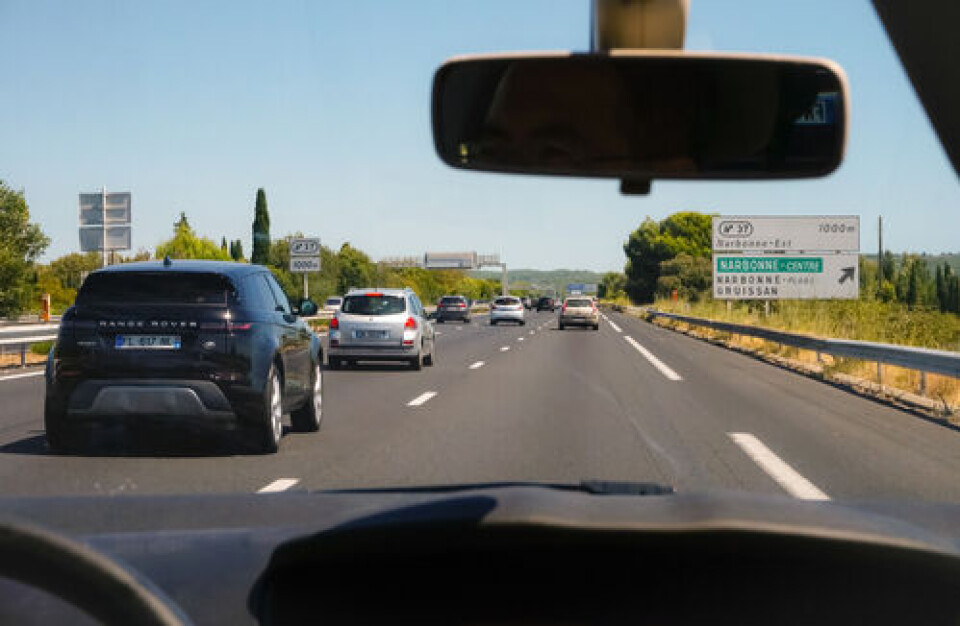-
Cheaper car fuel as French supermarkets launch two-day promotion
Cost-price fuel may also entice buyers into the supermarket
-
Map: French motorways and major roads to avoid as families head to slopes
Red traffic warnings are in place for Friday December 19
-
Are French speed limits lower when it is raining? How severe must weather be?
Several weather conditions affect maximum speeds in France
Explainer: 11 questions about private speed camera cars in France
Which regions of France do they operate in, who drives them and are they easy to spot? Some important questions answered

France conferred the job of driving unmarked speed camera cars to private companies in 2018 – they were previously driven by the police force.
They were introduced to detect speeding and the job was handed over to private companies to free up police time. The vehicles are equipped with so-called ‘new generation’ radars which are capable of flashing a vehicle while driving.
There are currently a few hundred of the cars operating in France but their number is set to increase next year.
Here, we look at 11 frequently asked questions about these cars.
1. Exactly how many of these unmarked speed camera cars are operating in France?
There were 226 at the end of 2021, but this is set to increase to 450 in 2023. The cars are driven by staff employed by four different private companies.
2. Which regions of France do they operate in?
They are currently operating in Normandy, Brittany, Centre-Val de Loire, Pays de la Loire, Nouvelle-Aquitaine, Grand Est, Bourgogne-Franche-Comté and Hauts-de-France. They are set to be rolled out to Auvergne-Rhône-Alpes, Occitane, Provence-Alpes-Côte-d'Azur and Ile-de-France in 2023.
3. Do they operate on all roads or just motorways?
Around 500,000 infractions were detected by both private and police radar cars in 2021, figures by Sécurité Routière, the government’s road safety agency, show.
Almost all (96%) of the checks took place on roads with a speed limit of 80 or 90km/h, which are usually departmental roads away from built-up areas. Only 77,000 checks took place on roads with a speed limit of 110km/h or 130km/h.
4. What fine can you expect to get if you are caught?
Fines vary according to how much over the limit you are, from €68 and a point deduction for being less than 20km/h over the limit to up to €1,500 and a three-year ban if you are more than 50km/h over the speed limit.
5. Are private speed camera cars easy to spot?
No, as they tend to use models that blend in such as a Peugeot 308, Dacia Sandero, Seat Leon or a Ford Focus. If you have an eagle eye you might be able to spot a bulky device on the dashboard and rear parcel shelf.
6. Do they operate all day every day?
They are on the road for five or six hours a day and issue on average around two tickets per hour according to La Ligue de Défense des Conducteurs. They could be out on roads during the day or night any day of the week, including possibly on bank holidays.
Drivers are limited to a certain number of kilometres each day.
7. Do you know when they have flashed you?
No – you will usually find out when notification of the fine drops through your letterbox.
It is not the private company that decides to issue you with a fine, but instead a member of the police force who will review the information captured by the speed camera.
Private radar car drivers do not know when they have flashed a car or how many cars they have flashed during their shift. The route of private cars is defined by local authorities, targeting areas with a high accident rate.
8. Do they only detect speeding or are other driving offences also in their remit?
The cars are charged solely with detecting speeding vehicles.
They have a built-in margin of 10km/h for speeds of below 100km/h and a margin of 10% for speeds above this.
This means, for example, that if you are doing 88km/h in an 80km/h zone, you will not get flashed.
Other speed cameras in France have a margin of 5km/h for speeds below 100km/h and 5% above this speed.
9. Who drives these private cars and do they get a bonus for issuing a fine?
To become a driver you need to have a clean driving licence, no criminal record, and three years driving experience. The annual salary is around €22,000 a year.
The drivers do not receive any extra money for the number of vehicles their cameras catch speeding.
10. Can drivers be flashed on both sides of the road?
Private speed camera cars can flash cars on either side of the carriageway, but can only flash cars coming in the opposite direction if there is no central reservation.
The police can only issue fines using information captured by the speed camera cars if the cars are moving, not if they are parked.
11. Can you be flashed more than once on the same road?
Yes. Cases have been reported where drivers have received two tickets, with a very short distance between each ticket. This might be explained by the fact that there were two private radar cars on the same route driving within a short distance of the driver.
Related articles
Record 5,600 speed cameras to be operating in France by 2023
French private speed camera cars caught over 500,000 drivers in 2021
Speed cameras: fines for braking are ‘unworkable’ in French law
























